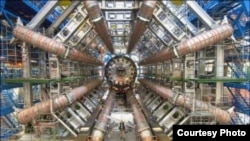CERN engineers said Tuesday that they had resolved a problem that delayed the relaunch after a two-year refit of the Large Hadron Collider particle smasher, which is probing the mysteries of the universe.
A statement from the research center just outside Geneva said a metal fragment that caused an intermittent short circuit in one of the giant magnets in the vast underground complex had been successfully removed.
The relaunch of the so-called "Big Bang" machine had to be postponed last week because of the problem.
CERN, the European Organization for Nuclear Research, said that after new tests on all the circuits in the area where the fault appeared, the way would be clear for proton particles to be sent in opposite directions right around the machine's 27-kilometer underground tubes. This could happen "in a few days," the statement said.
However, proton particle collisions at twice the power of the first runs, which brought the discovery of the long-sought Higgs boson, will not begin until May, physicists said.
These collisions, at almost the speed of light, create the chaotic conditions inside the collider close to those that followed the Big Bang 13.8 billion years ago, from which the universe eventually emerged.
The product of the collisions is captured in the collider's giant detectors and is analyzed by scientists at CERN and around the world for signs of new information about the cosmos and how it works at the elementary particle level.
Among the aims of scientists at the revamped collilder is to establish the existence of the unseen dark matter that makes up about 96 per cent of the stuff of the universe, but has been detected only through its influence on visible objects.





